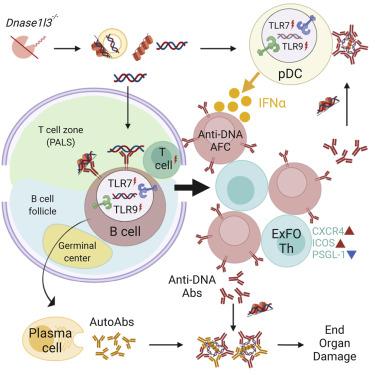Immunity ( IF 32.4 ) Pub Date : 2020-05-25 , DOI: 10.1016/j.immuni.2020.04.015 Chetna Soni 1 , Oriana A Perez 1 , William N Voss 2 , Joseph N Pucella 1 , Lee Serpas 1 , Justin Mehl 1 , Krystal L Ching 1 , Jule Goike 3 , George Georgiou 4 , Gregory C Ippolito 5 , Vanja Sisirak 6 , Boris Reizis 7

|
Class-switched antibodies to double-stranded DNA (dsDNA) are prevalent and pathogenic in systemic lupus erythematosus (SLE), yet mechanisms of their development remain poorly understood. Humans and mice lacking secreted DNase DNASE1L3 develop rapid anti-dsDNA antibody responses and SLE-like disease. We report that anti-DNA responses in Dnase1l3−/− mice require CD40L-mediated T cell help, but proceed independently of germinal center formation via short-lived antibody-forming cells (AFCs) localized to extrafollicular regions. Type I interferon (IFN-I) signaling and IFN-I-producing plasmacytoid dendritic cells (pDCs) facilitate the differentiation of DNA-reactive AFCs in vivo and in vitro and are required for downstream manifestations of autoimmunity. Moreover, the endosomal DNA sensor TLR9 promotes anti-dsDNA responses and SLE-like disease in Dnase1l3−/− mice redundantly with another nucleic acid-sensing receptor, TLR7. These results establish extrafollicular B cell differentiation into short-lived AFCs as a key mechanism of anti-DNA autoreactivity and reveal a major contribution of pDCs, endosomal Toll-like receptors (TLRs), and IFN-I to this pathway.
中文翻译:

浆细胞样树突状细胞和 I 型干扰素促进滤泡外 B 细胞对细胞外自身 DNA 的反应。
双链 DNA (dsDNA) 类别转换抗体在系统性红斑狼疮 (SLE) 中普遍存在且具有致病性,但其发生机制仍知之甚少。缺乏分泌型 DNase DNASE1L3 的人和小鼠会出现快速的抗 dsDNA 抗体反应和 SLE 样疾病。我们报道, Dnase1l3 -/−小鼠中的抗 DNA 反应需要 CD40L 介导的 T 细胞帮助,但通过位于滤泡外区域的短寿命抗体形成细胞 (AFC) 独立于生发中心形成而进行。I 型干扰素 (IFN-I) 信号传导和产生 IFN-I 的浆细胞样树突状细胞 (pDC) 可促进体内和体外DNA 反应性 AFC 的分化,并且是自身免疫下游表现所必需的。此外,内体 DNA 传感器 TLR9与另一种核酸感应受体 TLR7 一起,在Dnase1l3 −/−小鼠中促进抗 dsDNA 反应和 SLE 样疾病。这些结果将滤泡外 B 细胞分化为短命 AFC 确定为抗 DNA 自身反应性的关键机制,并揭示了 pDC、内体 Toll 样受体 (TLR) 和 IFN-I 对此途径的主要贡献。



























 京公网安备 11010802027423号
京公网安备 11010802027423号